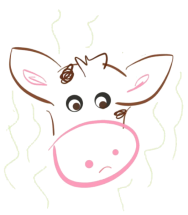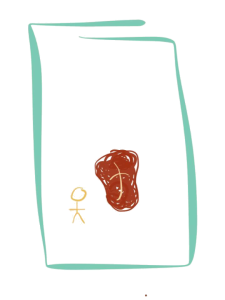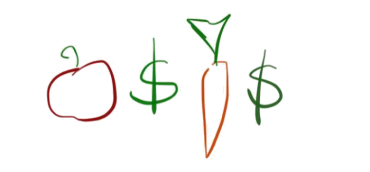One of the arguments I often hear about veganism is ‘what would happen if everyone stopped eating animal products?’ usually followed by ‘we would have to grow so many plants!’ and sometimes the less thought out ‘what would happen to all the cows?’ Whilst all interesting thoughts, there are more topical issues behind the idea. What’s more, these issues are becoming more and more important as keeping the current diet of the world is becoming less and less viable in terms of sustainability. A vegan world may look like a dream to me, but what would it mean for everyone else? And as a side note – all the cows would probably be okay, we would just stop breeding them for food.
Animals are gassy
As I discussed in a post last week, meat production takes a serious toll on our environment. However, what’s less known is the effects of dairy, and this problem is particularly bad here in New Zealand. Dairy demand is increasing worldwide for a number of reasons – spreading urbanisation, growing wealth and westernisation of diets in China and India, and population growth. This is a problem because more cows means more pollution, as they produce gases that have higher effects on global warming such as methane, and their manure contains nitrous oxide that poisons waterways. Both the beef and dairy industries are responsible for these emissions. Eggs, too, do their bi t – requiring around the same level of energy to produce as chicken meat according to this study. If we maintain our current diets, greenhouse gas levels are expected to be 51% higher by 2050. So, what would cutting out animal products do for climate change?
t – requiring around the same level of energy to produce as chicken meat according to this study. If we maintain our current diets, greenhouse gas levels are expected to be 51% higher by 2050. So, what would cutting out animal products do for climate change?
A study by the University of Oxford programme that used data from the UN Food and Agriculture Association, the World Health Organization and other epidemiological data calculated some impressive results – a 44% drop in greenhouse gas emissions by 2050 by adopting a vegetarian diet, and 55% drop by adopting a vegan one. These savings translated to a boggling $511 billion and $570 billion saving respectively for the US – clearly something worth investing in!
Animals need space

Animal agriculture occupies around 30% of the earth’s land and is a major cause of deforestation. Large forests, such as the Amazon, are the lungs of the planet as they produce the oxygen we breathe and take carbon dioxide out of the air. However, when these trees are burned they release all of that carbon dioxide back into the atmosphere, which contributes to global warming. This isn’t to say that 30% of the land is covered in animals – it’s the crops that are grown to feed them, such as corn and soybeans, which need the space. Livestock consumes 70% of the crops we grow, and that means the calories we receive from animal products far from balance with the calories needed to feed the animals themselves. Research has shown that for a 2.5 acre piece of land, 23 people can be fed by growing cabbage, 22 by potatoes and 19 by rice whereas beef, milk and eggs can fee d only 1 person on the same amount of land.
d only 1 person on the same amount of land.
How could this land be used more effectively? An article by the BBC suggests that 80% of the land previously used for animal agriculture could be dedicated to restoring grasslands ad forests that would capture more carbon dioxide and provide more habitats for species. The remaining land could supply enough plant food to support humans based on the above statistics. However, one problem with this hypothesis is the fact that a lot of the earth’s land in infertile and cannot grow crops, and is therefore used to farm animals instead. Nomadic groups for example rely on animals for food in these areas.
Lifestyle changes
Animal agriculture provides thousands of jobs worldwide. By shifting to just horticulture, millions of people would have to adjust their careers and would need support to do so. Failure in this aspect of the equation would mean huge economic disruption in terms of unemployment, especially in rural communities. Additionally, groups with close ties to meat in terms of religion, history and tradition may lose some of their cultural identity – a fact that biodiversity and resource researcher Ben Phalan suggests is the cause of why global vegetarianism has failed thus far.
World Health
Multiple studies document the health benefits of veganism, though most people remain convinced that consuming animal products is necessary for health (though this isn’t helped by large-scale animal agriculture industry advertising and role in government approved nutritional advice). Despite this common ‘knowledge’, multiple studies have documented the health advantages of excluding animal products from our diets. Consuming animal products has been shown to increase the risk of developing cancer, diabetes, rheumatoid arthritis, hypertension and heart disease in many studies, however changing to a wholefoods vegan diet has also been shown to reverse many of these illnesses as no cholesterol is consumed and saturated fat intake is massively reduced. Also, these vegan diets are high in fibre and other nutrients. It’s no mistake that much of the world’s population is overweight and ill by consuming the standard western diet of meat, dairy and eggs with too few fruits, vegetables and whole grains.
Would switching to a vegan or vegetarian diet lower the world’s health risks? Apparently so – this research also found that lower rates of heart disease, stroke, type 2 diabetes and cancer led to 7.3 million fewer deaths by adopting a vegetarian diet, and 8.1 million by adopting a vegan one. In terms of health costs, this translated to $973 billion and just over $1 trillion respectively for the US.

Would it be possible?
It seems that a global transition towards vegetarianism and veganism has the potential to solve many of the crises we may have to face in terms of climate change, whilst improving our overall health and saving significant amounts of money. Massive economical and lifestyle disruptions would have to occur, but my question is – how much is our, and our planet, worth to us? And our future generations?
Peace and science,
Vegiance.
Header image under licence of Creative Commons.
Other images by Summer Gleeson.
awesome post – nice sum up of the reasons to change – and when you read it, its like, there’s no reason not to change!
LikeLike
Thank you! I totally agree!
LikeLiked by 1 person